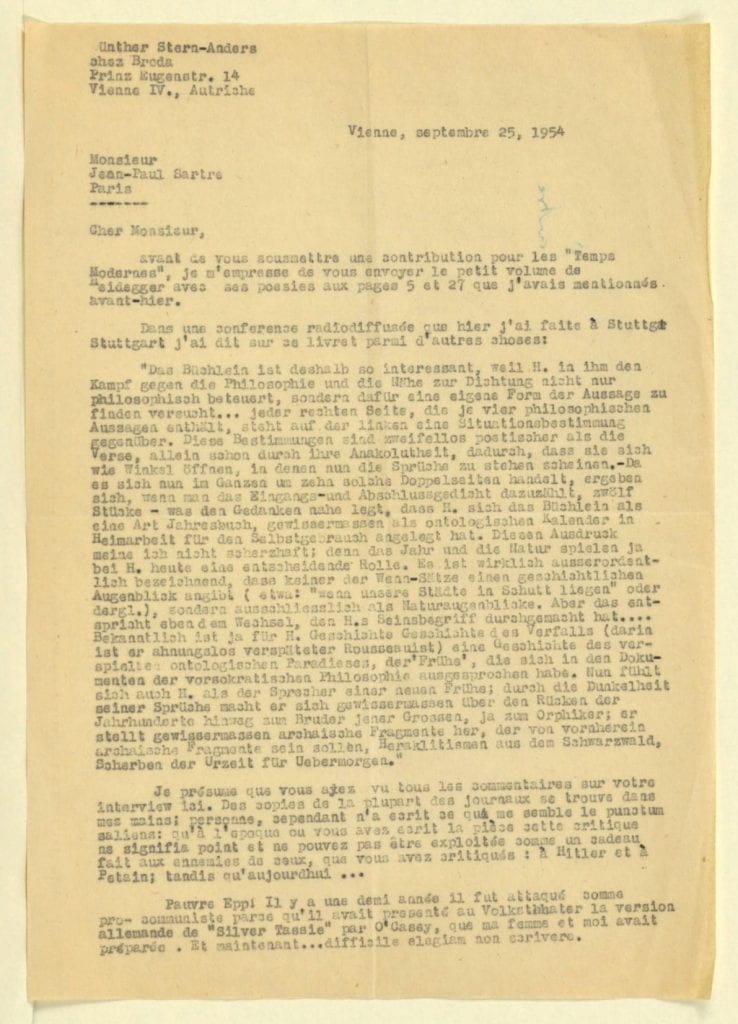By Anna Pollmann
More than a decade before their political collaboration in the Vietnam War Crimes Tribunal in 1966–67, the German-Jewish thinker Günther Anders (1902–1992, born Günther Stern) wrote a letter to Jean-Paul Sartre (1905–1980) in 1954 in the latter’s capacity as editor of the journal Les Temps Modernes. This journal, founded shortly after the end of the Second World War, was perhaps the most important medium for the postwar French literary-political scene and for French existentialism. It was here that Sartre had developed his concept of “engaged literature,” repeatedly turning his attention to contemporary political issues such as colonialism. Anders wrote to Sartre with the intention of getting a chapter of his philosophical diary notes entitled “Ruins Today” published in the journal in French.
However, before Ruines aujourdʼhui landed in the mailbox of the Paris-based editors of Les Temps Modernes, Anders announced a postal vanguard: “Before submitting my contribution to Les Temps Modernes, I hasten to send you a small volume of Heidegger [From the Experience of Thought], with his poems on pages 5 and 27.”
Evidently it was important for Anders to let Sartre know in advance of receiving the manuscript his thoughts regarding Heidegger’s turn to language, as well as about Heidegger’s philosophical enterprise of existential ontology as such. Heidegger’s postwar writings were extremely influential in French existentialist intellectual circles. In his letter, Anders quoted at length from his own critical radio review dedicated to Heidegger’s “little volume” Aus der Erfahrung des Denkens [From Out of the Experience of Thinking], written in 1947 and published in 1954. His amused undertone in view of Heidegger’s poems cannot be missed: If one measured them “by Heidegger’s prophetic standard,” one must simply be “embarrassed.” The volume was only “so interesting because in it Heidegger not only philosophically affirms the struggle against philosophy and the proximity to poetry, but also seeks to find his own form of expression for it. In some lines, the acquainted reader could recognize Heidegger’s philosophy—and this group included both Anders (his former student) and Sartre (who had affirmingly referred Anders to Heidegger).
Heidegger’s turn to language expressed not only his aversion to academic philosophy and its linguistic forms, but also the view that poetry could help to give language to Being. In his influential 1927 magnum opus Being and Time, he had described human history as one of decay and “forgetfulness of being.” Central to Heidegger’s philosophy, as Günther Anders put it in a 1953 radio address, was “the shock that there is something” which, especially among his readers, took on the character of a “philosophical event[s].” It was not only the Heideggerian exaltation of poetry as “real thinking” that Anders contradicted, since after the Second World War he himself questioned whether poetry was at all an appropriate form with which to respond to the world after the catastrophe. [1] Another critical point in Anders’s letter to Sartre concerns Heidegger’s historical escapism. It is “extraordinarily significant,” we can read here, “that none of [Heidegger’s] if-sentences [Wenn-Sätze] indicates a historical moment (for example: ‘when our cities lie in ruins’ or the like), but only moments of nature.”
In his American exile (1936–1950), Anders had worked through Heidegger’s writings extensively and critically, especially his important major work Being and Time. Together with Hannah Arendt (his first wife) and Hans Jonas, he had studied with Heidegger at Freiburg in the 1920s. Existential ontology, precisely in its turn to factual existence, provided them a fascinating philosophical reaction to the crisis-ridden Weimar years. The fact that its author was able to bring his philosophy into line with the National Socialist program forced particularly his Jewish students to undertake a critical inventory of their personal relationship with Heidegger and to draw lines of philosophical demarcation. How serious Anders was about his own “De-Heideggerization” is documented by several hundred pages of manuscripts and typescripts in which he was eager to determine the nature of the “historical moment” in which Heidegger’s philosophy could become so popular. Selections from these manuscripts were published in two essays. In “On the Pseudo-Concreteness of Heidegger’s Philosophy,” from1948, Anders contrasted Heidegger’s central concepts with a materialist theory of needs. In Nihilism and Existence, published two years earlier, he aimed to show “that what advertises itself as a new beginning of positive metaphysics is the last, dressed-up formulation […] [of] nihilism.” Here he located the origins of Being and Time “in the shadow of the first postwar” and asks how fundamental ontology could finally have become a “European event […] in the ruin sites of the second.” He understood the enthusiastic reception among leftist intellectuals in France as a retreat into the “terrible seriousness of one’s own existence” after the disintegration of the Résistance and as an escape from the political tasks prescribed by the postwar situation (“Nihilismus und Existenz” [1946], 41). Andersʼs critique is remarkable not only on account of the timeliness of its interrogation of Heideggerian categories around the time of their publication, but also with regard to its broad scope. However, it has been largely forgotten.
Anders’s critique of Heidegger was part of a larger interrogation of the concept of history that took shape in very different forms during his years on America’s East and West Coasts. Like his extensive notes on Heidegger’s Being and Time, these manuscripts remained unpublished for a long time—some even until today. It is notable that in the year 1941, when France was defeated by the Wehrmacht and the Nazi attack in the Soviet Union began, Anders begins his diaries with observations of his workplace in Hollywood as a cleaner of historical stage props (“Leichenwäscher der Geschichte,” translated and introduced by Christopher John Müller).
Around the same time he began working on two manuscripts entailing a historical-critical inquiry into the concept of progress. The concept of progress, Anders writes, has been “over-determined” from the start, “nourished by motives of different origins which slowly condense as exhibits for the truth in this one magic formula.” Anders reviews the historical genesis of the concept from Christian eschatology, to Condorcet’s emphatic belief in historical necessity, to Bacon’s concept of the domination of nature and Kant’s idea of the infinite development of the moral subject. The teleology of the workers’ movement is for Anders a condensation of all the motives of the ideology of progress. Here he finds moments of eschatology, liberation, reason, and self-liberation in the form of class-consciousness. [2] All of these were connected with the notion of labor—a connection that Anders questions already and which he will completely negate in his main work Die Antiquiertheit des Menschen: Über die Seele im Zeitalter der Zweiten industriellen Revolution [mostly translated into English as The Obsolescence of Mankind] published in West Germany in 1956. This essay collection, later termed his “philosophical anthropology of the technocratic age” was received alongside pessimistic reflections on the technocratic era written by conservatives or right wing thinkers such as F. G. Jünger and Arnold Gehlen, and also together with Heidegger’s Frage der Technik (The Question Concerning Technology) (1954).
After the mass annihilations of Auschwitz and Hiroshima Anders developed a radical critique of the domination of modern technology, as well as the Marxist categories of the ontology of labor and an emancipatory concept of History. At the same time, these very categories supported his main objections to Heidegger’s notion of Geschichtlichkeit. In Anders’s writings from the 1940s one can see the tension—if not struggle—between a critique of a progress-driven teleology of History and History as normative framework with which to grasp and interpret the catastrophes he had witnessed. These lines are blurred in his famous critique of technology, Die Antiquiertheit des Menschen. Aided by the fact that his lucid and critical readings of Heidegger appeared on the periphery, as a critic of technology Anders was quite often perceived as a disciple of Heidegger, “reading with and against him” (Brumlik).
At the time his two critical articles appeared in a Swedish and an American journal, a heated debate about the rehabilitation of Heidegger and his philosophy took place in France in 1946–47 in the journal Les Temps Modernes. The debate was been triggered by two contributions from Frédéric de Towarnicki (1920–2008), an officer in the French military, and the philosopher Maurice de Gandillac (1906–2006). De Towarnicki had provided Heidegger with an invitation to military headquarters in Baden-Baden, where he was to meet with Jean-Paul Sartre. Anders was only indirectly involved in this debate. The philosopher Karl Löwith (1897–1973) had asked him to translate his reply to de Torwarnicki, in which he explicitly discussed the connection between Heidegger’s philosophy and National Socialism.
It cannot be coincidence that Anders selected his diary notes “Ruins Today”for publication in Les Temps Modernes, where they were in fact published in issue 108 shortly after Anders addressed his letter to Sartre. In placing his description of rubble landscapes and discussing questions of morality and guilt as well as historical causalities, Anders seemingly wanted to invoke once again the particular historical context for the reception of Heidegger’s writings. Fittingly, his reflections begin in the destroyed South-Western German town of Freiburg, where Anders first attended Martin Heidegger’s lectures in the 1920s.
This essay originally appeared in German on the Mimeo Blog of the Simon Dubnow Institute for Jewish Studies in Leipzig. It draws upon themes and material from Chapter 5, “Anders liest Heidegger,” of the author’s recent book, Fragmente aus der Endzeit. Negatives Geschichtsdenken bei Günther Anders(Göttingen: Vandenhoeck & Ruprecht 2020).
Footnotes
[1] Anders, “Dichten heute,” Die Wandlung. Eine Monatsschrift 5 [1949], H. 1, 40–55. This is the first text Anders published in Germany after returning from his American exile.
[2] Literaturarchiv der Österreichischen Nationalbibliothek Wien (LIT), Nachlass Günther Anders, 237/W61, History of Ideas: The Concept of Progress 1940/Need and Idea. Suggestion for a Speech of the Congress for Philosophy 1939/Disposition für „Die Unfertigkeit des Menschen“ und der Begriff „Fortschritt“, ohne Ort, 1939–1940; 237/W60, Fortschritt und Monismus (undated). On these archival fragments see also Kerstin Putz, The Letters of Günther Anders. His Correspondence with Hannah Arendt, in: Günter Bischof, Jason Dawsey, and Bernhard Fetz, eds., The Life and Work of Günther Anders. Émigré, Iconoclast, Philosopher, Man of Letters (Innsbruck, 2014), 131–142.
Sources
Archival image: LIT, Nachlass Günther Anders, 237/B1508, Letter Günther Anders to Jean-Paul Sartre, September 25, 1954. © Literaturarchiv der Österreichischen Nationalbibliothek, Wien.
Dr. Anna Pollmann is a postdoctoral researcher at the University of Konstanz’s Research Institute for Social Cohesion.
Featured Image: Günther Anders in a rubble landscape in the Wrocław city center, summer 1966. © Literaturarchiv der Österreichischen Nationalbibliothek, Wien.






